Conor Geraghty – Farmgate
Veterinary Group,
Mountbellew, Co Galway
Counties covered: GalwayWhat has been happening and what are you seeing on your travels this spring?
We’re seeing spring a little earlier this year and it has made the practice a lot busier than usual in February. We are seeing all the usual things that spring brings to a large animal practice. Difficult calving cases, difficult lambing cases and milk fevers would count for a lot of it at the moment. We are seeing ewes in very good order and that means lambs are big so it could cause issues later in spring. Prolapses also seem to be a little more common because of this.
What always comes up and what’s the biggest simple thing a farmer can do to improve things this spring?
I know it’s always talked about but colostrum is one single biggest thing a farmer can concentrate on to reduce problems in spring. Making sure that cows and ewes calve/lamb down with enough colostrum is a good start. That means getting the dry period diet right. A simple check when cows calve is also useful to make sure that all teats are good and that she has colostrum. I sometimes see farmers who are tight on space in calving pens putting cows and calves back in on slats too soon after calving. The calf ends up sucking dirty teats and this is a recipe for cryptospirosis. Try to keep young calves on straw for as long as possible.
What issues are coming down the line that haven’t reared their heads yet?
The reality is that things are tightening up big time in relation to the use of antibiotics and I don’t think the industry has grasped how this is going to affect the way we do business. This time next year we may not have access to some well-known drugs and we have to ask ourselves the question what will we do differently to avoid being in the situation of needing them and not having them. Space is a big issue for me and, on many farms, there probably isn’t adequate space, especially in spring. A bad spring and overstocked sheds can lead to a lot of disease buildup and pressure and then you get an outbreak of disease.
Paddy McGinn – Carrick Vets,
Carrickmacross, Co Monaghan
Counties covered: Louth/MonaghanWhat has been happening and what are you seeing on your travels this spring?
A big issue in dairy cows compared to other years is an upsurge in clinical milk fever. It points to subclinical milk fever being high in dairy herds and I think this is being ignored. Many cows are being treated for clinical milk fever without the origins of the problem being properly investigated and many farmers aren’t aware of the future complications associated with subclinical milk fever. There probably is an increase in subclinical ketosis this year due to cows being fatter at calving.
What always comes up and what’s the biggest simple thing a farmer can do to improve things this spring?
The one thing farmers can do now is clean the environment thoroughly to reduce disease burden and step up vaccination to strengthen immunities. That will keep animals safe from a lot of animal health threats. Disease can build up exponentially, so now is the time to do a deep clean even if it appears to be impossible due to a lot of calves being inside. This will also help in the prevention of pneumonia, coccidiosis and cryptosporidium.
What issues are coming down the line that haven’t reared their heads yet?
We need better communication between all the farm bodies in relation to restrictions of antibiotics and selected dry cow therapy in January 2022. The veterinary profession can’t deal with this one at the last minute. Vets will need a lot of time to look at milk-recording reports and spend much longer giving advice to farmers on a one-on-one basis. We need to question the sustainability of large animal vet practices.
There is a huge brain drain into other fields of veterinary away from large animal practice. I honestly believe we are at a turning point. Farmers need a strong vibrant large animal veterinary service now more than ever and there is a chance it won’t be there in some regions of the country. Farmers need their large animal vets to know the workings of their farm and need advice on sheds, the environment, vaccinations management and nutritional advice. I think we need to take a big look at dairy calf-to-beef performance at grass and we need to reassess dairy calf performance on grass.
Animal health needs to be to the fore in these systems. There are major pitfalls in getting it wrong which will have a negative effect on long-term profitability of these farms. There has to be greater communication locally between farmers, farmer groups, nutritionists, Teagasc and vets to improve animal welfare and animal performance on these farms.
Owen Hand – Ashwood Veterinary Centre, Mohill, Co Leitrim
Counties covered: Leitrim/Longford/CavanWhat has been happening and what are you seeing on your travels this spring?
Our client base are predominantly suckler farmers, so we are just starting to get busy now. We saw a lot of calving issues early in the year and we are putting it down to lots of good silage made last year and cows are in very good condition. There is also no shortage of silage this year. If silage was scarce, some cows may be on straw or being restricted on silage which would mean fitter cows at calving. We are also seeing a lot of scour very early this year. When we do the snap tests, it’s coming back as cryptospirosis. We see this every year but we are seeing it earlier this year.
What always comes up and what’s the biggest simple thing a farmer can do to improve things this spring?
Calf scour is a problem every year on some farms. Hygiene is very important. Clean calving pens, regular disinfection and adequate colostrum intake all help to reduce the incidence of scour. It’s important that farmers don’t skimp on straw or bedding in calving pens. Straw is very expensive this year in the northwest but an outbreak of calf scour and losing calves as a result could be a lot costlier. Scour vaccination can help in the prevention of a scour outbreak. However, it will only work if basic animal husbandry is good.
What issues are coming down the line that haven’t reared their heads yet?
I suppose looking to the future you have to be concerned about the loss of critical antibiotics. I think we have to move this way to protect these products for both animal health and human health, but it requires new thinking as to how we go about our daily jobs.
Vaccinations have a big role to play and in the practice we would have seen some very good results over the past few years, particularly in farmers buying weanlings. They have seen better performance and reduced illness and vet callouts as a result of implementing a vaccination programme.
Donal Murphy – Sliabh Luachra Vets, Rathmore, Co Kerry
Counties covered: Kerry/CorkWhat has been happening and what are you seeing on your travels this spring?
Things have really started to get busy here in the last two weeks. Calving generally begins on our clients’ farms around 1 February, so with that comes lots of issues. Calving cases and milk fever are probably taking up most of our time at the moment. I’m not sure that milk fever cases are up. It’s just the sheer volume of calving cases that are taking place and these cases come with that. Everything has become more and more condensed in recent years. We are just starting to see a few stomach displacements. They generally start to follow three weeks after calving.
What always comes up and what’s the biggest simple thing a farmer can do to improve things this spring?
Calf scour can be a huge issue on some farms and, in a lot of cases, it’s very preventable. I don’t think enough farmers are vaccinating their cows for scour. It’s a very good vaccine and can cut out a lot of hassle in spring. It’s probably too far into calving to think about that now but maybe for the later cows it could be an option. A big thing I see on farms as well in spring is not having enough help. Some dairy farmers, in particular, are very stretched and that’s fine when everything is going ok but when you get an outbreak of scour and you have to get around all the other jobs, as well as tending to sick calves, this can put immense pressure on an already over-stretched system.
What issues are coming down the line that haven’t reared their heads yet?
I think we still haven’t grasped the effects of what the reduction in critical antibiotics will be and I see this as a huge issue for our profession and our industry. I think Covid-19 has focused everybody’s thoughts on other things and we have almost lost some time in meeting other important challenges to our industry. Vaccinations will play a big role in the future but getting farmers to take it up as a management tool has been difficult.
Conor Geraghty – Farmgate
Veterinary Group,
Mountbellew, Co Galway
Counties covered: GalwayWhat has been happening and what are you seeing on your travels this spring?
We’re seeing spring a little earlier this year and it has made the practice a lot busier than usual in February. We are seeing all the usual things that spring brings to a large animal practice. Difficult calving cases, difficult lambing cases and milk fevers would count for a lot of it at the moment. We are seeing ewes in very good order and that means lambs are big so it could cause issues later in spring. Prolapses also seem to be a little more common because of this.
What always comes up and what’s the biggest simple thing a farmer can do to improve things this spring?
I know it’s always talked about but colostrum is one single biggest thing a farmer can concentrate on to reduce problems in spring. Making sure that cows and ewes calve/lamb down with enough colostrum is a good start. That means getting the dry period diet right. A simple check when cows calve is also useful to make sure that all teats are good and that she has colostrum. I sometimes see farmers who are tight on space in calving pens putting cows and calves back in on slats too soon after calving. The calf ends up sucking dirty teats and this is a recipe for cryptospirosis. Try to keep young calves on straw for as long as possible.
What issues are coming down the line that haven’t reared their heads yet?
The reality is that things are tightening up big time in relation to the use of antibiotics and I don’t think the industry has grasped how this is going to affect the way we do business. This time next year we may not have access to some well-known drugs and we have to ask ourselves the question what will we do differently to avoid being in the situation of needing them and not having them. Space is a big issue for me and, on many farms, there probably isn’t adequate space, especially in spring. A bad spring and overstocked sheds can lead to a lot of disease buildup and pressure and then you get an outbreak of disease.
Paddy McGinn – Carrick Vets,
Carrickmacross, Co Monaghan
Counties covered: Louth/MonaghanWhat has been happening and what are you seeing on your travels this spring?
A big issue in dairy cows compared to other years is an upsurge in clinical milk fever. It points to subclinical milk fever being high in dairy herds and I think this is being ignored. Many cows are being treated for clinical milk fever without the origins of the problem being properly investigated and many farmers aren’t aware of the future complications associated with subclinical milk fever. There probably is an increase in subclinical ketosis this year due to cows being fatter at calving.
What always comes up and what’s the biggest simple thing a farmer can do to improve things this spring?
The one thing farmers can do now is clean the environment thoroughly to reduce disease burden and step up vaccination to strengthen immunities. That will keep animals safe from a lot of animal health threats. Disease can build up exponentially, so now is the time to do a deep clean even if it appears to be impossible due to a lot of calves being inside. This will also help in the prevention of pneumonia, coccidiosis and cryptosporidium.
What issues are coming down the line that haven’t reared their heads yet?
We need better communication between all the farm bodies in relation to restrictions of antibiotics and selected dry cow therapy in January 2022. The veterinary profession can’t deal with this one at the last minute. Vets will need a lot of time to look at milk-recording reports and spend much longer giving advice to farmers on a one-on-one basis. We need to question the sustainability of large animal vet practices.
There is a huge brain drain into other fields of veterinary away from large animal practice. I honestly believe we are at a turning point. Farmers need a strong vibrant large animal veterinary service now more than ever and there is a chance it won’t be there in some regions of the country. Farmers need their large animal vets to know the workings of their farm and need advice on sheds, the environment, vaccinations management and nutritional advice. I think we need to take a big look at dairy calf-to-beef performance at grass and we need to reassess dairy calf performance on grass.
Animal health needs to be to the fore in these systems. There are major pitfalls in getting it wrong which will have a negative effect on long-term profitability of these farms. There has to be greater communication locally between farmers, farmer groups, nutritionists, Teagasc and vets to improve animal welfare and animal performance on these farms.
Owen Hand – Ashwood Veterinary Centre, Mohill, Co Leitrim
Counties covered: Leitrim/Longford/CavanWhat has been happening and what are you seeing on your travels this spring?
Our client base are predominantly suckler farmers, so we are just starting to get busy now. We saw a lot of calving issues early in the year and we are putting it down to lots of good silage made last year and cows are in very good condition. There is also no shortage of silage this year. If silage was scarce, some cows may be on straw or being restricted on silage which would mean fitter cows at calving. We are also seeing a lot of scour very early this year. When we do the snap tests, it’s coming back as cryptospirosis. We see this every year but we are seeing it earlier this year.
What always comes up and what’s the biggest simple thing a farmer can do to improve things this spring?
Calf scour is a problem every year on some farms. Hygiene is very important. Clean calving pens, regular disinfection and adequate colostrum intake all help to reduce the incidence of scour. It’s important that farmers don’t skimp on straw or bedding in calving pens. Straw is very expensive this year in the northwest but an outbreak of calf scour and losing calves as a result could be a lot costlier. Scour vaccination can help in the prevention of a scour outbreak. However, it will only work if basic animal husbandry is good.
What issues are coming down the line that haven’t reared their heads yet?
I suppose looking to the future you have to be concerned about the loss of critical antibiotics. I think we have to move this way to protect these products for both animal health and human health, but it requires new thinking as to how we go about our daily jobs.
Vaccinations have a big role to play and in the practice we would have seen some very good results over the past few years, particularly in farmers buying weanlings. They have seen better performance and reduced illness and vet callouts as a result of implementing a vaccination programme.
Donal Murphy – Sliabh Luachra Vets, Rathmore, Co Kerry
Counties covered: Kerry/CorkWhat has been happening and what are you seeing on your travels this spring?
Things have really started to get busy here in the last two weeks. Calving generally begins on our clients’ farms around 1 February, so with that comes lots of issues. Calving cases and milk fever are probably taking up most of our time at the moment. I’m not sure that milk fever cases are up. It’s just the sheer volume of calving cases that are taking place and these cases come with that. Everything has become more and more condensed in recent years. We are just starting to see a few stomach displacements. They generally start to follow three weeks after calving.
What always comes up and what’s the biggest simple thing a farmer can do to improve things this spring?
Calf scour can be a huge issue on some farms and, in a lot of cases, it’s very preventable. I don’t think enough farmers are vaccinating their cows for scour. It’s a very good vaccine and can cut out a lot of hassle in spring. It’s probably too far into calving to think about that now but maybe for the later cows it could be an option. A big thing I see on farms as well in spring is not having enough help. Some dairy farmers, in particular, are very stretched and that’s fine when everything is going ok but when you get an outbreak of scour and you have to get around all the other jobs, as well as tending to sick calves, this can put immense pressure on an already over-stretched system.
What issues are coming down the line that haven’t reared their heads yet?
I think we still haven’t grasped the effects of what the reduction in critical antibiotics will be and I see this as a huge issue for our profession and our industry. I think Covid-19 has focused everybody’s thoughts on other things and we have almost lost some time in meeting other important challenges to our industry. Vaccinations will play a big role in the future but getting farmers to take it up as a management tool has been difficult.



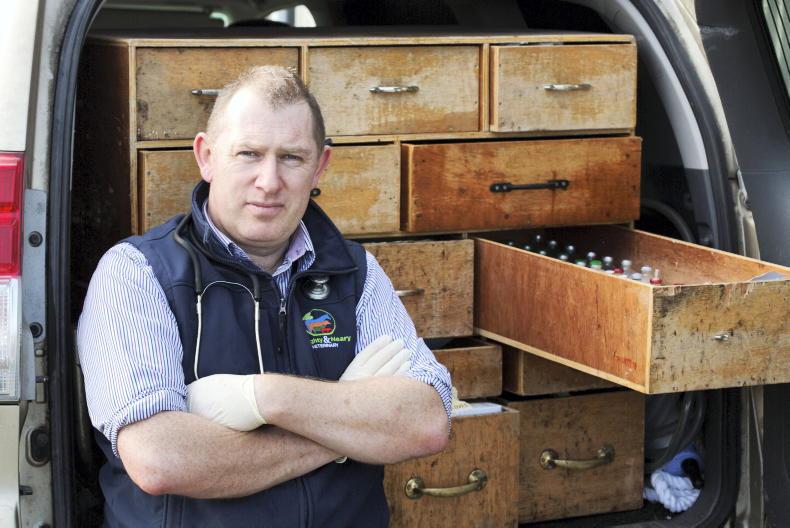

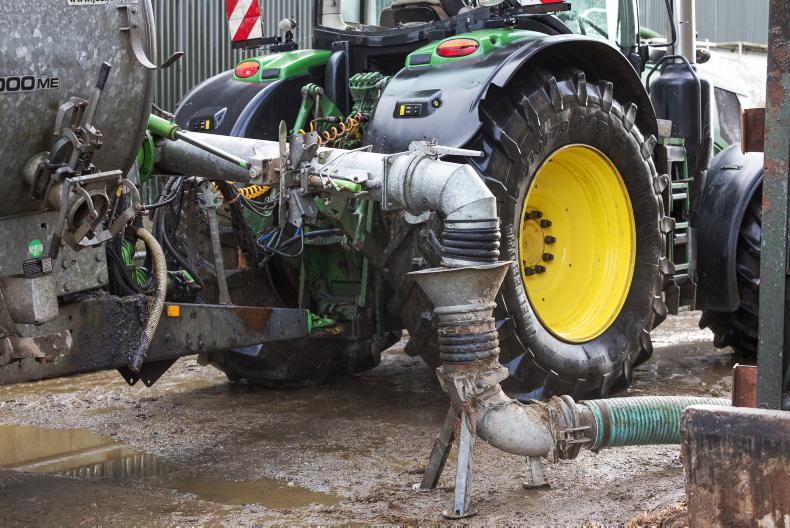
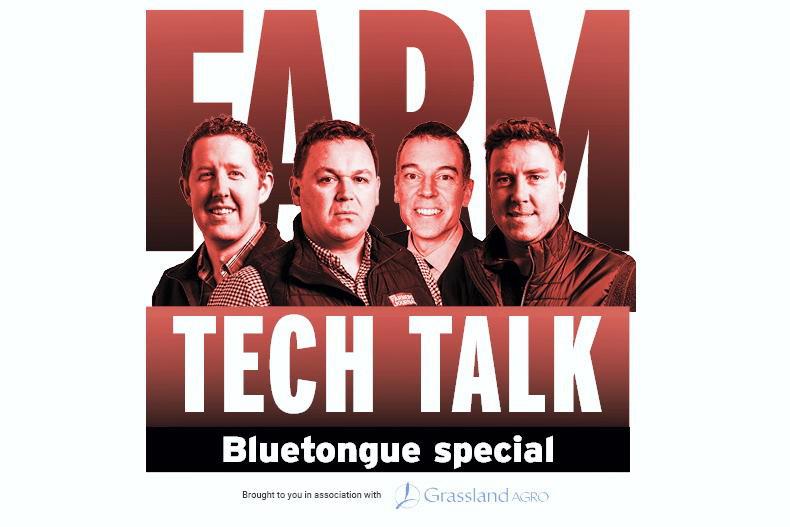
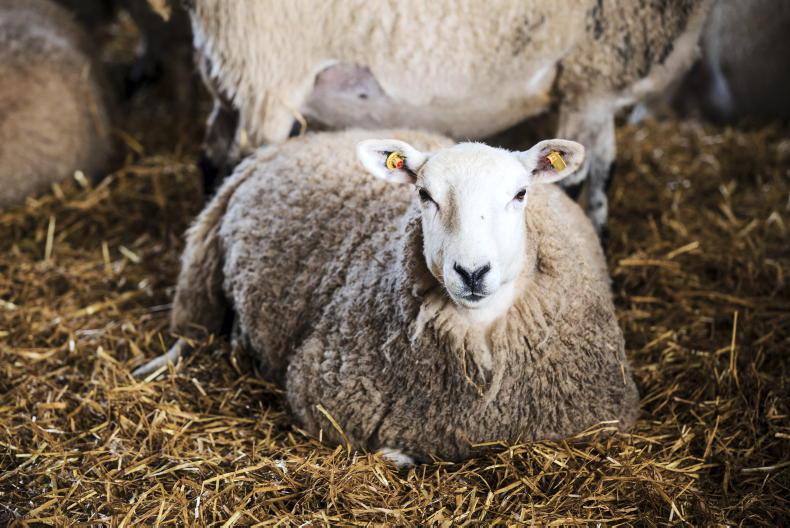
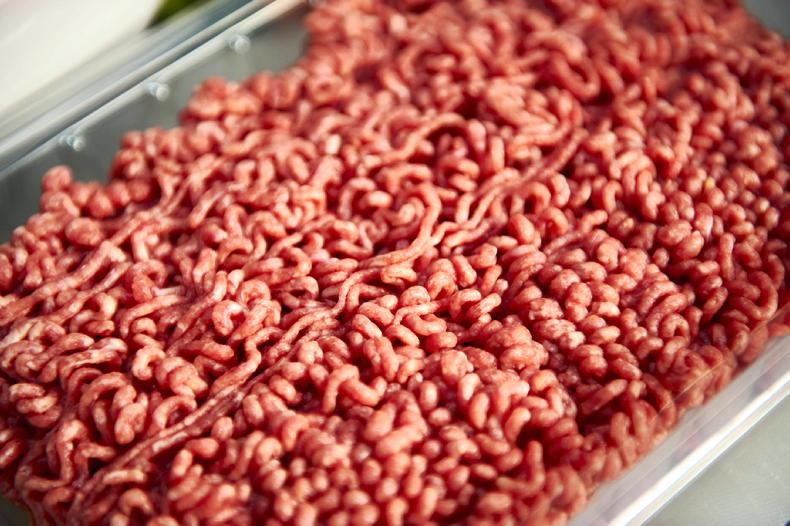
SHARING OPTIONS